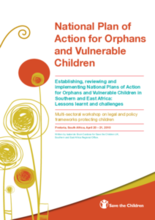This report focuses on the experiences of Save the Children in monitoring, implementing and reviewing NPAs in Angola, Ethiopia, South Africa, Swaziland, Mozambique, Uganda and Zimbabwe. Each of the country offices commissioned the documentation of case studies to identify promising practices and challenges around effective implementation of NPAs.
This report consolidates these case studies and aims to draw lessons learnt from the various efforts undertaken by the country offices. The report analyses the differing processes that have been carried out in order to identify and develop a set of key messages and recommendations. Furthermore, this publication contextualizes the development of NPAs on Orphans and Vulnerable Children (OVC) in the context of current thinking around social protection for all children in need. It also highlights the debate between stand-alone NPAs and mainstreaming children’s issues into existing development strategies.
Despite the varying HIV epidemiological, infrastructure, political will and child welfare contexts of the seven case study countries, there are several areas that all identified, either as a promising practice or as a challenge, to implementing NPAs or other child-focused legal instruments. The report’s key learning’s and recommendations are directed at these four themes. These areas include:
-
User-friendly and timely dissemination of NPA across national, district and community levels.
-
Coordination, buy-in and accountability of key stakeholders, including government, to implement the NPA, particularly at national level.
-
Community capacity strengthening to ensure the effective mobilisation and use of bothcommunity structures and resources, including linkages with government facilities andservices to operationalise the NPA.
-
Children’s meaningful and ongoing participation in supporting the implementation process.

